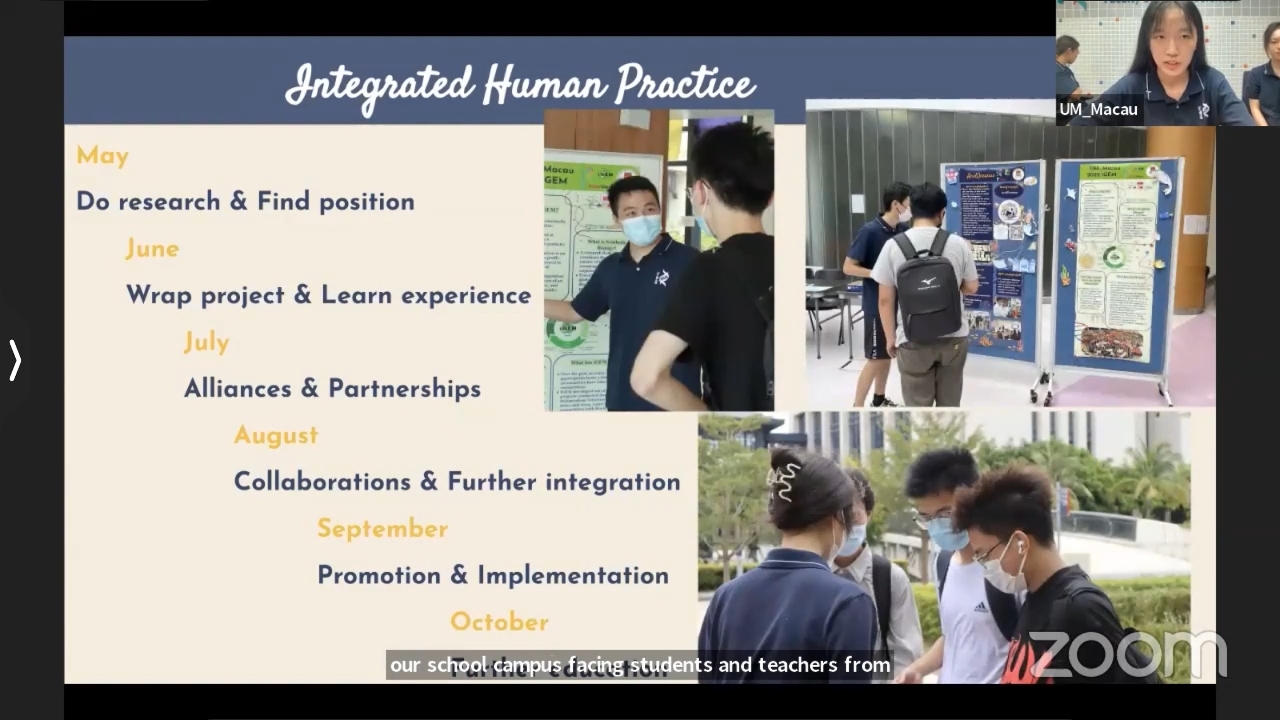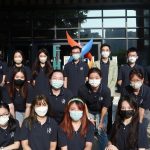 The UM team competes in the final held online
The UM team competes in the final held online
A team of undergraduate students from the University of Macau (UM) Faculty of Health Sciences (FHS) recently won a gold medal at the International Genetic Engineered Machine (iGEM) competition for a research study on reducing acidity in the water environment. This year’s competition attracted 346 teams from 41 countries and regions, including teams from top universities such as the Massachusetts Institute of Technology, Harvard University, Tsinghua University, and Peking University. This is the fourth consecutive year that UM has won an award in this international competition and also the third time that the university has won a gold medal.
Ocean plays an essential role in absorbing carbon dioxide, regulating climate, and providing marine products. However, the huge amount of carbon dioxide absorbed by the ocean because of the increasing carbon dioxide emissions since the beginning of 21st century consequently has reduced the carbonate amount within the seawater and lowered the oceanic pH. Under the supervision of FHS Associate Professors Leo Lee Tsz On and Tam Kin Yip and Professor Garry Wong, the UM iGEM team, which was formed by 22 undergraduate students, developed a project titled ‘AcidOceanus’ to explore how to slow the acidification of the ocean. The project aimed to maintain the balance of marine ecology via the genetic modification of Escherichia coli (E. coli) to absorb the hydrogen ions in the acidified water.
Wu Xinrui, leader of the UM team and a third-year student in the FHS, says that the team members engaged in various activities in their spare time to prepare for the competition, including designing the project, conducting experiments, exchanging with other teams, promoting awareness of environmental issues at local primary and secondary schools, and creating a website to showcase their research results. They overcame various challenges during that period, from which they developed their scientific knowledge and enriched their soft skills. The winning of the gold medal is a recognition of UM students’ research skills and ability to solve problems in society. This is the fourth consecutive year that UM has won an award in this international competition since 2019 and also the third time that the university has won a gold medal.
In addition, a team from Pui Ching Middle School (Macao) supervised by Prof Lee and FHS Associate Professor Liu Tzu-Ming also won awards at this competition. Over the years, UM has worked with local primary and secondary schools to foster students' interest in science and enhance their research skills from an early age, with a view to contribute to the development of scientific and technological talent in Macao. With a project titled ‘Supporting Hydroponic Farming Using Engineered Bacteria: Hormone-targeting and pH-adjusting Systems’, the team from Pui Ching Middle School was ranked second in the high school category and won a gold medal as well as other prizes. To prepare for the competition, the students used their leisure time to study, do research, and analyse experiment data at UM’s laboratories.
The iGEM was founded in 2003 as an intersession course at the Massachusetts Institute of Technology. It became a summer competition in 2004 and has been a global competition since 2005. At the competition, student-teams from all over the world meet to solve global challenges using knowledge of synthetic biology. The competition attracts many teams from around the world each year. This year's iGEM was held online, where teams came together to present their latest research in a mutually beneficial and friendly competitive environment.



